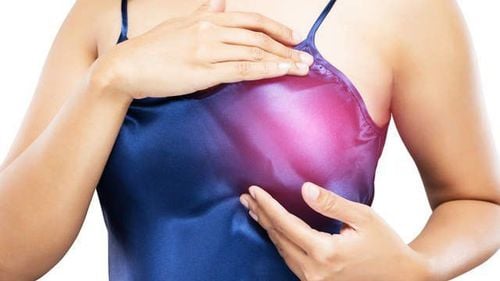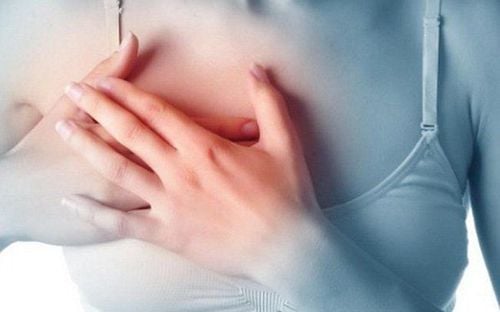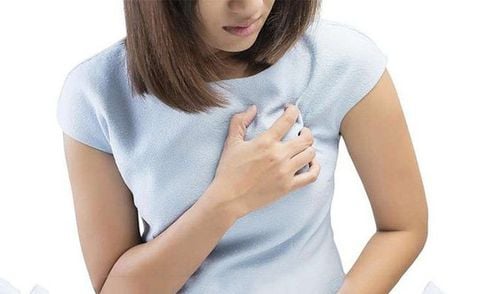This is an automatically translated article.
Breast and nipple discharge is quite common in non-pregnant or non-breastfeeding women, especially of reproductive age. Discharge is not necessarily abnormal, but it can happen even in post-menopausal women. If the nipple discharge is spontaneously unilateral and colored, it may be considered abnormal. However, for men, perhaps nipple discharge will be an unusual case.
1. Breast and nipple discharge
Breast discharge or discharge is discharge from the nipple in women who are not pregnant, not breastfeeding or even in men. The condition of nipple discharge in women is not abnormal in all cases, but it is still necessary to see a specialist for further evaluation. For men with nipple discharge, it is necessary to see a doctor immediately to determine the cause.
Nipple discharge may appear on one or both breasts. A white discharge may resemble milk, but it may be yellow, green, or brown, or even bloody. The density of the fluid also varies with its consistency, viscous, thin...
Breast and nipple discharge can be milk or another type of fluid. Therefore, breast discharge is generally not suitable for non-pregnant and non-breastfeeding women because it is related to the extent to which prolactin levels can stimulate mammary gland tissue. And in some cases, patients with high levels of prolactin will produce more milk.
2. What causes breast and nipple discharge?
Lactation - normal functioning in pregnant and lactating women. Or it could be due to hormonal changes during the menstrual cycle. Or lactation due to post-pregnancy causes nipple discharge to be mixed with blood
Papules in the mammary duct may be benign, not cancerous, but may be accompanied by bloody discharge or brown, black, or nipple discharge with a foul odor. Although nipple discharge and blood may clear up on its own, you will still need tests and ultrasounds to check for any damage. In some cases, a biopsy may be needed to confirm for sure if a papilloma is present.
Usually breast and nipple discharge is benign, but in some cases it can be due to breast cancer when there are additional signs such as breast lump, only one breast, spontaneous discharge , secretions involve only a single tube.
Common causes of breast and nipple discharge include: abscess, breast cancer, breast infection, ductal carcinoma in situ, breast overstimulation, fibroadenoma, fibroma of the breast, hormonal imbalance, damage or trauma to the breast, dilation of the ducts of the breast, hormonal changes during the menstrual cycle, pregnancy, prolactin-secreting tumors....
3. Signs that a patient needs to see a doctor
If you are still in your period and the discharge does not go away on its own or even lasts until the next period, you need to see a doctor.
If you are postmenopausal and still have spontaneous discharge and only one breast or a single tube is involved, this discharge could be cancerous. You need to see a doctor for diagnostic tests. In case, a lump in the breast, with oozing fluid mixed with blood, it is necessary to immediately monitor this situation for timely support.
For people who are over 40 years old and have spontaneous breast discharge and nipple discharge, sometimes a lump is palpable in the breast, it is necessary to go to the doctor immediately to confirm. Especially if the patient is a man.
4. Examination, diagnosis and treatment of breast and nipple discharge
The doctor will initially do a physical exam for breast and nipple discharge by examining the symmetry of the breasts, skin indentations, changes in breast color, sore nipples, or indent no. Next, the breast will be manipulated to look for lumps in the breast or axillary nodes. If spontaneous discharge is not present, a systematic examination of the area around the nipples can be performed to stimulate drainage and identify the specific site involved in the discharge.
The diagnosis of breast and nipple discharge is not at all simple. This symptom may be a manifestation of a normal physiological state or it may also be a disease related to the mammary gland or disease in another location that increases the blood prolactin level, affecting milk secretion in the breast.
A systemic review of the body to diagnose breast and nipple discharge helps to suggest possible causes. In addition, the doctor will also need to learn more about the previous medical history to determine if the cause of hyperprolactinemia, such as: chronic kidney failure, liver disease, gland related disease thyroid or have a history of infertility, high blood pressure, depression, or menstrual disorders ...
For men, the diagnosis of breast and nipple discharge can be caused by testosterone hormone deficiency and often accompanied according to gynecomastia in men. Breast cancer is rare in men. To diagnose ductal carcinoma of the male breast, the physician should perform fine-needle aspiration and cytological examination of the breast secretions. The only specific tumor in the male breast is gynecomastia in men - gynecomastia and in women it is a small adenoma. The most common symptom of carcinoma in men is a small lump under the areola and about 20% of it is nipple discharge. Bloody discharge from the male breast should also be carefully examined by a doctor because it can be suspected as a carcinoma.
Treatment of breast and nipple discharge will usually be based on the cause. If the cause of this condition is benign and the discharge can be continuous, it will greatly disturb the patient in daily life. Once this condition is determined, the doctor can perform a resection of the end of the duct to improve this discharge.
Breast exams are performed in many reproductive health services. Breast examination combined with counseling and guidance on breast self-examination helps to detect breast diseases and detect breast cancer early. The best time for breast examination and breast self-examination is about 2-3 days after menstruation. Women aged 20-39 should have a breast exam every 1-3 years, and women 40 and older need a breast exam once a year.
To help customers detect and treat breast - gynecological cancer early, Vinmec International General Hospital has a package of screening and early detection of breast - gynecological cancer, helping customers detect diseases early. and easy, inexpensive treatment.
Please dial HOTLINE for more information or register for an appointment HERE. Download MyVinmec app to make appointments faster and to manage your bookings easily.













